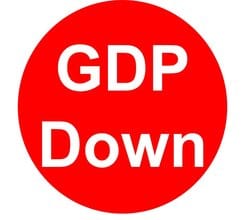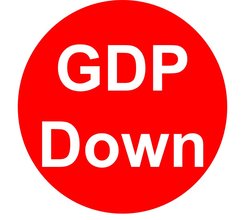The Japanese economy shrank by -7.1% in Q2 2014, revised data from The Cabinet Office showed, the steepest contraction in five years, which is a devastating setback for Prime Minister Shinzo Abe as he tries to stimulate the economy.
Initial estimates had indicated that Q2 GDP contracted by -6.8%.
In quarterly terms, Japan’s GDP contracted by -1.8% in Q2 compared to Q1, when it expanded by 1.5%.
On April 1, authorities in Japan raised consumption tax (sales tax, VAT) from 5% to 8%. Consumers and businesses clearly accelerated their purchases before the tax hike and then pulled back afterwards.
Purchases of more expensive items, such as cars, homes and TVs soared before April 1, when the first tax increase in 17 years took effect.
Private consumption is a key component of the Japanese economy, representing about 60% of total GDP.
Business and private consumption plunged
According to revised data, household and business consumption in Q2 2014 both plunged by -5.1%.
Economists in Japan, North America and Europe said the GDP (gross domestic product) contraction was worrying, even after taking into account the higher sales tax.
During the second quarter, capital spending was much less than expected, while corporate inventories swelled, suggesting that goods on store shelves are not being sold.
For Japan to have a sustainable recovery, corporate and private spending needs to be strong, because exports and public spending have failed to lift growth.

Abenomics, i.e. Prime Minister Abe’s policies to stimulate growth, have bolstered corporate profits and pushed up the value of Japanese shares, which should have strengthened the economy enough to withstand the sales tax hike, policy makers had expected.
Clearly, however, corporate profits have not yet trickled down to boost consumer spending.
Salaries in Q2 2014 increased at a slower rate than sales tax, 1.6% and 3.4% respectively.
Forty economists at the Japan Center for Economic Research forecast GDP to grow by 4.01% (annualized) in the third quarter and then by 2.03% in Q4. They also predict that for the whole of 2014, GDP will grow by 0.48% and then by 1.38% next year.
What about the next planned sales tax rise?
Mr. Abe is planning to raise sales tax further next year by two percentage points to 10%. Japan has the largest public debt among the advanced economies, so raising revenue is crucial.
However, with such weak data, what will he decide to do? Carry on as planned or postpone?
According to Japanese media, Mr. Abe will decide on the second sales tax hike in December.
Akira Amari, Japan’s Economy Minister, said on Friday that the government is considering introducing a stimulus package that would help reduce the impact of another sales tax increase.
Mr. Amari said:
“No countries have doubled the sales tax rate over a year and a half. I expect that he (Mr. Abe) will make a considerably cautious decision.”
Figures released in August revealed that factory output had remained flat in July.

